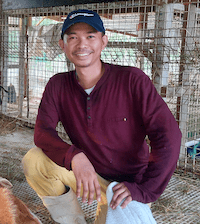The Philippines possesses fertile agricultural lands and abundant natural resources, a potential avenue for driving the nation towards advancement and prosperity.
Nonetheless, the Philippine agriculture, forestry, and fishing sector have seen limited growth over the past years, as per the data provided by the Philippine Statistics Authority (PSA).
In the year 2022, the sector’s expansion remained at a mere 0.5%, with its contribution to the overall gross domestic product (GDP) noticeably trailing behind the industry and services sectors, constituting 29.7% and 61.4% of the economy in 2022, respectively.
Concurrently, the share of Philippine agriculture in the same year amounted to a mere 8.9%. Despite the sector’s lackluster performance, it employs around 20% of the nation’s workforce.
Unfortunately, the Philippine agriculture sector has been hit hard by natural disasters and the worsening repercussions of climate shifts. The United Nations World Food Programme (WFP) disclosed that approximately 20 tropical cyclones infiltrate the Philippine Area of Responsibility annually, with about 8 or 9 directly affecting the country.
These extreme climatic events have led to substantial economic losses over the past ten years, amounting to P463 billion. Out of this figure, P290 billion, or 62.7%, were attributed to damages incurred by the Philippine agriculture sector.
The recent typhoon “Egay,” which struck northern Luzon, resulted in over 170,000 affected farmers and fisherfolk, alongside agricultural losses reaching P4.47 billion as of August 3. This has adversely impacted not only crop production but also the livelihoods of numerous Filipinos.
Adding to these challenges is the significant issue of illicit trade in the Philippine agriculture sector. Due to its covert nature, tracking and quantifying illicit trade proves challenging. A notable legislative endeavor is the amendment of Republic Act No. 10845, the Anti-Agricultural Smuggling Act, aimed at protecting local farmers, consumers, and food security. Currently, RA 10845 classifies large-scale agricultural smuggling as economic sabotage.
Products subject to high taxes, such as tobacco, are particularly susceptible to illegal trade. Given its “sin” product status, taxes on tobacco are substantial. These taxes contribute to funding universal healthcare in the Philippines.
In a recent event organized by the National Tobacco Administration (NTA), Regulatory Head Robert Ambros noted that tobacco smuggling results in annual revenue losses of about P30 billion.
Commissioner Romeo Lumagui Jr. of the Bureau of Internal Revenue (BIR) highlighted that the tobacco industry has contributed an average of P147 billion annually in excise tax payments over the last five years, constituting at least 50% of total annual excise tax revenues.
Lumagui, however, emphasized that illicit trade undermines government revenues and damages the economy. He noted, “Its immediate impact lies in the loss of urgently needed tax revenues for economic recovery. Illicit trade also saturates the market with subpar products, posing health risks. It fosters unfair competition and endangers the local workforce.”
Bureau of Customs (BOC) Commissioner Bienvenido Rubio shared that in March 2023, the bureau introduced its 5-Point Priority Program, including measures to enhance border security and combat smuggling. Nevertheless, baseline actions merely mark the beginning; actual outcomes hinge on authorities’ actions, as mere lip service falls short of solving the Philippine agriculture problem.
Tackling illicit trade becomes pivotal in shielding the economy, particularly the Philippine agricultural sector, from dire consequences. This illegal practice jeopardizes economic stability, tarnishes legitimate businesses, diminishes government revenues, threatens consumer health, compromises jobs, and undermines food security.
Consequently, a collective endeavor involving governments, international entities, private stakeholders, and civil society organizations is vital to safeguard the Philippine agricultural sector and, by extension, fortify the economy against the detrimental impacts of illicit trade.
Moreover, harnessing digital technologies for increased transparency and bolstering law enforcement can significantly contribute to curbing Philippine agriculture illicit trade. The conventional reliance on taxation as a solution proves inadequate and even fosters alternative forms of illegal trade.
At the very least, the tax-centric approach to combating illicit trade in Philippine agriculture should be reevaluated and supplemented with more targeted solutions, including robust regulations and stringent law enforcement.
Through unwavering commitment to eradicating illicit trade and creating a level playing field for lawful market participants, an empowered populace can ensure a sustainable Philippine agricultural sector, fostering economic well-being and safeguarding the nation and its citizens.

Mr. Jaycee de Guzman is a self-taught agriculturist and the founder and patriarch of Alpha Agventure Farms, recognized as the leading backyard farm in the Philippines. With a rich background in livestock farming dating back to the early 1990s, Mr. de Guzman combines his expertise in agriculture with over 20 years of experience in computer science, digital marketing, and finance. His diverse skill set and leadership have been instrumental in the success of Alpha Agventure Farms.


